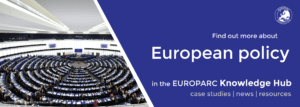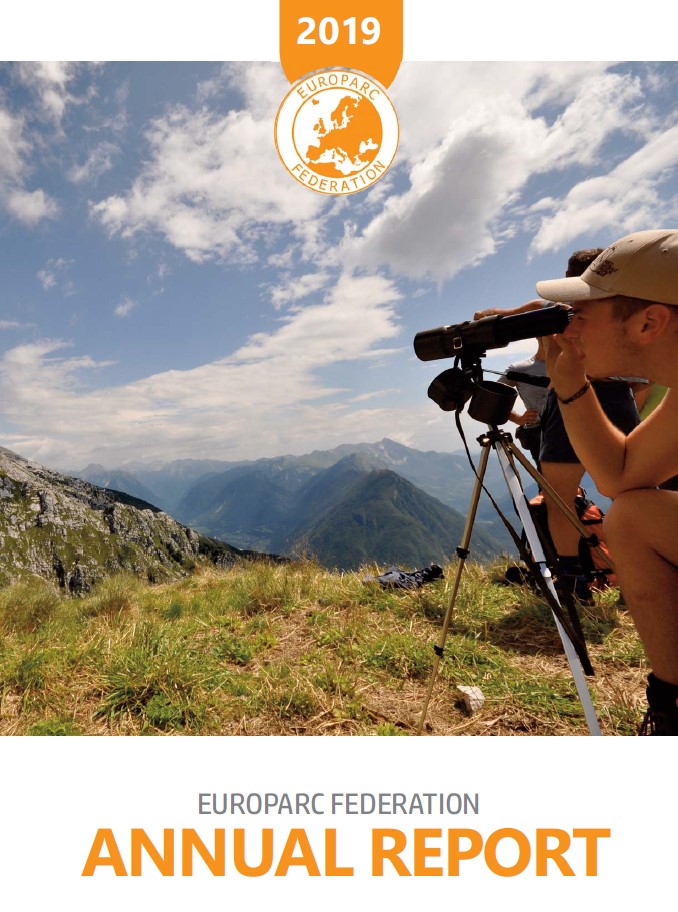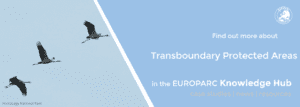The State of the European Union in the Protected Areas perspective
EU Commission President, Ursula von der Leyen by Arno Mikkor
In the State of the European Union address, the European Commission President Ursula von der Leyen presented the achievements and the challenges of the European Union and the plans for the coming year. How can we read this speech from the European Protected Areas perspective?
On the 16th of September, the European Commission President Ursula von der Leyen had her first SOTEU (State of the European Union) address to the European Parliament in Brussels. This important annual speech indicated the key topics and goals of the European Commission for the coming year.
A resilient environment
Referring to the extraordinary crisis of 2020, Ms von der Leyen’s vision for the next future is to move from fragility to resilience, in terms of human health, welfare, economy and sustainability. The latter being the main element of the European Green Deal, the President stressed the urgency of a transformation towards sustainability to protect “our fragile planet”. “The planet continued to get dangerously hotter” said Ursula von der Leyen. “We see it all around us: from homes evacuated due to glacier collapse on the Mont Blanc, to fires burning through Oregon, to crops destroyed in Romania by the most severe drought in decades”.
We know change is needed – and we also know it is possible. The European Green Deal is our blueprint to make that transformation.
The EU Green Deal aims to make Europe climate neutral by 2050. The President introduced a new ambitious target to reduce CO2 emissions by at least 55% before 2030. This reduction was an increase of 15% compared to the previous target. This increase is necessary, according to the European Commission, to meet the Paris agreement and UN SDG’s. The President stated that the EU impact assessment clearly shows that European economy and industry can manage this, and a large number of SME’s and some of the world’s biggest companies support this aim.
For us, the 2030 target is ambitious, achievable, and beneficial for Europe.
While the target is clear, it could be questioned which tools will be used to meet them and whether they will be met at all. Indeed, the European Parliament debate reflected the division between supporters of a strong EU commitment and who is sceptic or definitely against it.
Other important topics
Another challenge is to balance a sustainability transformation with economic growth and stability, which are also points of attention for the European Commission. “Never before has that enduring promise of protection, stability and opportunity been more important than it is today”. The recovery plan “NewGenerationEU” is based on these principles.
Another central topic in the address was health. The Covid 19 Pandemic should serve as a lesson for future health crises, and this experience shows the need of a stronger European Health Union: A union that is able to reserve more coordination and more funding for healthcare from the European level. Ms von der Leyen also underlined that a healthier and greener society go hand in hand.
But we also saw nature come back into our lives. We longed for green spaces and cleaner air for our mental health and our physical wellbeing.
In every topic that Ms von der Leyen mentioned, youth played a central part. The next generation is pushing for change in terms of a better planet, solidarity and human rights and they can teach a lot to adults and to the European Union.
The president also mentioned the digital acceleration we are now experiencing while working from home and that EU should takes the lead in this process, in terms of data, technology and infrastructure.
Other topics that Ms von der Leyen mentioned were the importance of European values and human rights, as well as the need of EU solidarity, especially, but not only, for the reception of immigrants and asylum seekers.
The long speech of Ms von der Leyen received several positive reactions. To make the ideas of the European Commissions into feasible plans, they will need support from the European Parliament and the Council of the EU. While some MEPs in the debate were critical, especially when it came to climate and sustainability, the majority declared their support. Also, the representative of the German Presidency of the Council of the EU, Michael Roth, showed broad support in his opening speech. He stressed the importance of cohesion between European institutions and having a common objective, in particular about climate change and environment.
Protected Areas perspective
From the Protected Areas perspective, we welcome the positive approach, the optimism and the commitments that permeated the speech. We would have liked to hear more about biodiversity protection and sustainable use of nature resources, as well as about marine environment and sea protection, in the framework of the EU Green Deal, nevertheless, we understand the need to touch also other topics that are crucial in the current debate in Europe. We can easily see how much all themes are connected with the Natura 2000 network and European Protected areas’ work.
Protected Areas are on the front line to look for and adopt new adaptive planning and governance tools accounting for Climate Change. In developing innovative methods, tools and services to perform climate change vulnerability assessment and develop adaptation plans, Protected Areas can indicate to other actors and territorial managers how to prevent and react to Climate change impacts.
Economic growth and nature conservation not only can, but should, be connected. The UN’s vision, assumed by the EU Green Deal, finally underlines clearly that no sustainable economic development –and a fair society- is possible without a healthy biosphere. Protected Areas are real laboratories where every day new solutions are explored for sustainable agriculture, sustainable fishery, sustainable tourism, revitalization of rural areas and creation of green jobs.
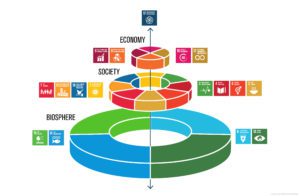
Sustainable Development Goals by Azote Images for Stockholm Resilience Centre
Human health is not possible without a healthy Planet, in terms of for example air quality and the quality of our food. Protected Areas provide what human being need in terms of mental and physical wellbeing. This is reflected well in the Healthy Parks Healthy People Europe Programme that was set up by the EUROPARC federation to support parks in this aspect.
Youth are not just our future leaders; they can provide a great support for nature conservation in protected areas today. We only have to give them a chance: EUROPARC and Protected Areas are absolutely convinced and committed to involve young generation, from the Junior Ranger program to the Aiguestortes-Declaration, from to the EUROPARC Youth Manifesto to the representative of youth in the EUROPARC Council. Moreover, next year there will be new elections for the Youth Council.
The European plans on digitalisation can open up new opportunity for remote and rural areas, and offer new tools for nature monitoring and territorial planning. Nevertheless, this process must be carefully implemented. We already see that the huge increase of social media provides important support in public awareness but also displays new challenges in Protected Areas management (as visitors’ flow management).
Last, but absolutely not least: European values and human rights. The address of Von der Leyen was referring not only to the terrible issues about rights protection of migrants, racism and discrimination against minorities, but also about democracy and right to expression. To guarantee the right of local communities to have a voice and to participate to the decisions about their own territory is an engagement for EUROPARC: The participatory approach, the dialogue with local stakeholders, the effort to build good partnership with different actors in the Protected Areas. These are all at the core of the EUROPARC programs and training.
The way forward
It is evident that Protected Areas are ready to be one of the keys players necessary to meet the sustainability targets of the EU. We can show both the public and the decision makers that investing in a transition towards a sustainable Europe is good for society, economy and the environment- “PROPELLING EUROPE FORWARD: BUILDING THE WORLD WE WANT TO LIVE IN” as the President of the European Commission encouraged in the SOTEU 2020.
A year in review: Annual Report 2019
Every year, the EUROPARC Federation publishes its Annual Report in English, French and German to showcase the work we have been doing in accordance to our strategy.
In 2019 EUROPARC continued working towards its vision “Sustainable Nature, Valued by People“. Even though 2019 is already many months behind us and indeed, it might even feel like we are currently living in a different world, have a look at our Annual Report to see all that was achieved!
By EUROPARC’ s President, Ignace Schops
It was only 3 years ago, when Fedenatur took the courageous decision to close their organisation and join efforts with EUROPARC. Some may recall that joyful moment at the General Assembly in Portugal! In that short time our Periurban friends have complimented the work of EUROPARC bringing new perspectives from the natural parks closest to cities. The creation of the Periurban commission held the legacy of Fedenatur, but have move forward culminating in an excellent production of a policy paper on the role of Periurban parks. This was well referenced at the “Seminar-Dialogue on EU policies 2019”. Here parks, Natura2000 managers and EC officers met to discuss common topics from the perspective of management in the Protected Areas and that of policy makers in Brussels, thereby:
increasing mutual knowledge and contributing to bringing the EU institutions closer to citizens.
It was especially heartening to have representatives from 2 additional DG’s present, ie. DG region and DG Growth showing the cross cutting and integrated nature of work in Europe’s Protected Areas which is a particularly present in our Periurban parks.
In addition to Periurban, our other 3 thematic commissions, in Sustainable Agriculture, Health and Protected Areas and N2000 continued in 2019. They have been working over the year, bringing forward extensive work and ensuring members’ participation. Position papers produced through the work of the commissions include, a call to highlight the importance of N2000 and Protected Areas in the European election, the role of Periurban parks across a range of EU policies and the Jūrmala communique on health and Protected Areas
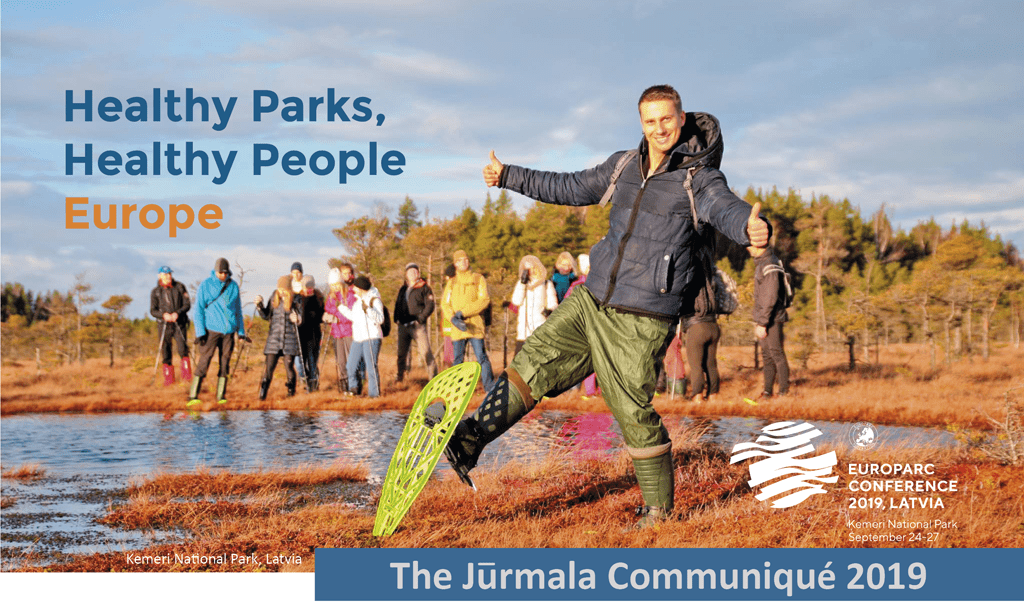 The Jurmala communique and launch of a new Healthy Parks, Healthy People Europe programme was just one of the highlights of the excellent conference, hosted by the Latvian Environment Agency near Kemeri National Park . We all left with a healthier outlook with our Green Prescription for Protected Areas in Europe. You can remind yourself here.
The Jurmala communique and launch of a new Healthy Parks, Healthy People Europe programme was just one of the highlights of the excellent conference, hosted by the Latvian Environment Agency near Kemeri National Park . We all left with a healthier outlook with our Green Prescription for Protected Areas in Europe. You can remind yourself here.
We progressed with our capacity building and knowledge sharing, which have been among our core activities over 2019. Trainings, workshops, webinars, videos, events and campaigns have been organised and very well received. A big effort in particular, has been made to ensure and support the active involvement of young people in Protected Areas, to build their capacity in becoming future leaders and advocates of nature conservation.
EUROPARC continued to be active in sustainable tourism with the European Charter for Sustainable tourism in Protected Areas, bringing a wider representation and participation by members in the work of the federation. For the first time, a special award for businesses and tour operators working in the framework of the Charter, were recognised. The “EUROPARC Star Awards” recognised the contribution of businesses in 4 areas; contributing to conservation, community development, communication and innovation, and were awarded at the Charter Award Ceremony 2019.
These were just some of the highlight for me for 2019, there is much more to be found in the remaining pages of this year’s Annual Report, for which I thank the contribution of my fellow council members, commissioners, sections and our ever valiant team in the Directorate.
Download the English Version Download the German Version Download the French Version
and visit this page to download EUROPARC previous Annual Reports!
Save the date! EUROPARC Conference 2021 goes to the Netherlands
The EUROPARC Conference is the event of the year for those working in Europe’s Protected Areas and Natura 2000 sites. Next year, EUROPARC Conference will take place from 4 to 8 October 2021 in Leeuwarden, The Netherlands. Save the date!
“Tribute to our landscape – Where nature and people meet in harmony”
In 2021, if the situation permits, we hope to once again meet face to face for the EUROPARC Conference. Hosted by The Dutch National Parks and partners, the EUROPARC Conference 2021 will take place in Leeuwarden, in the north of The Netherlands on the 4th till 8th of October 2021!
The theme of the conference is ‘Tribute to our landscape’ – where nature and people meet in harmony.
Our Landscapes, are part of the most valuable cultural treasures of the European society. It is where nature and people meet and interact in the past, present and in future.
Unfortunately, not always in harmony. We all realize societies in harmony with nature are crucial for present and future generations. The coronavirus pandemic has emphasized that more than ever. Finding harmony in the long run is the challenge. How can we act to meet this challenge, related to nature, human development, and sustainable economy?
Programme
The programme will offer inspiring keynote speakers, interactive workshops and a great variety of field trips to Dutch National Parks and the amazing landscape of the Waddensea, a UNESCO World Heritage site. In addition, we surely plan time for networking, meeting old and new friends, and to discuss experiences. All National Parks and partners are invited to present their activities at the marketplace.
Share your experience!
At the conference, we want you to actively share your experiences and challenges! Let us know about topics and ideas that interest you. Or do you want to provide a workshop yourself? Please contact us under info@europarc2021.nl.
Information
On the website www.europarc2021.nl you will find preliminary information. More information will follow. Registrations should open by May 2021.
or check out our previous Conferences.
TransParcNet Meeting 2020 ONLINE
With our huge regrets, the TransParcNet Meeting 2020 will move online due to last minute COVID restrictions. Stay tuned for updates about an alternative online meeting!
TransParcNet Meeting 2020 CANCELLED!
This year, the TransParcNet Meeting was supposed to take place in the transboundary park Binntal Veglia Devero.
Message from the hosts to expected participants:
Dear all,
we regret to inform you that the Trans Park Net Meeting in Binntal Veglia Devero was cancelled due to last minute COVID restriction which apply mainly to Switzerland (since September, 14th).
After putting a great deal of effort in organising the meeting in this difficult framework, we eventually came to the decision of cancelling it since many of the foreseen 22 participants would not be able to attend because of travelling restriction.
We apologise for any inconveniences which may be caused by this situation, and we remain at your disposal for any further needs and information.
Our availability to postpone the event for the next years still remains valid.
With our best regards,
Daniele Piazza and Andreas Weissen
ONLINE TransParcNet Meeting 2020
EUROPARC has decided that the TransParcNet Meeting will now take place in a digital format on the 9th of December from 9 – 16:30 CET!
